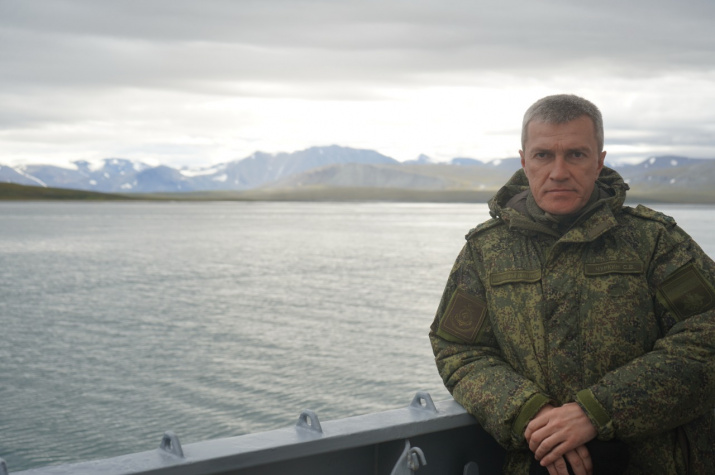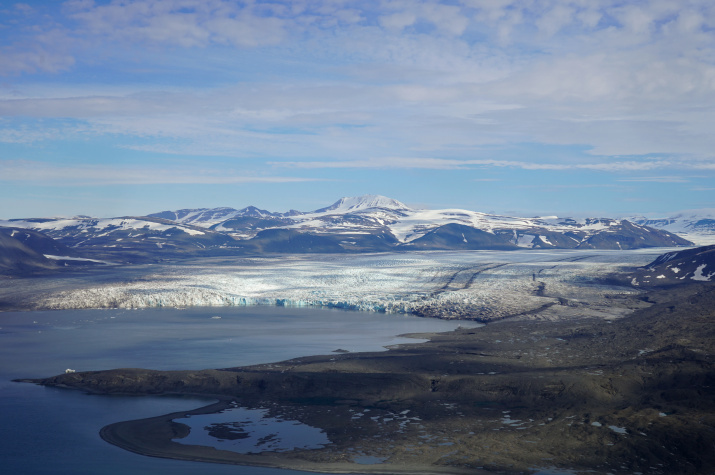Sergey Churkin is a Colonel, Head of the Northern Fleet Headquarters Department, member of the Russian Geographical Society, Arctic explorer. Scientific director of Complex expeditions of the Northern Fleet to the Arctic archipelagos. Winner of the national award "Crystal Compass" in the nomination "Travel and expeditions" in 2019 Winner of the RGS Award in the nomination "The best expedition around Russia" in 2020.
This is what Sergey Churkin says about himself: “I was born in Sverdlovsk in the family of Boris Churkin, Professor, Doctor of Technical Sciences, and Tamara Churkina, who taught maths at school for many years. After school, I spent one year at the Electrical Engineering Faculty of the Ural Polytechnic Institute. In 1989, I entered the Higher Naval School named after M. V. Frunze in St. Petersburg and graduated from it in 1994. I served in Kamchatka, Buryatia, Kaliningrad, and St. Petersburg. Since 2015 I have been living and working in Severomorsk. I am married to Natalia Churkina and have two children – Vladislav and Veronika.”
In 2018-2020 Sergey Churkin was the scientific director of three Complex expeditions conducted by the Northern Fleet as part of the historical and cultural project “The Main Facade of Russia. History, events, people". It was he who in 2018 proposed to Admiral Nikolai Evmenov, who was then the commander of the Northern Fleet, to conduct the research on Novaya Zemlya.
For three years, these expeditions have been working all around the Russian Arctic. Military, scientists and volunteers of the Russian Geographical Society explored places associated with the history of the development of Novaya Zemlya and Franz Josef Land, restored the routes of pioneer travelers, made significant discoveries. The expeditions reconstructed the routes of Leonid Grinevetsky, Feodosiy Chernyshev, Vladimir Rusanov. They also confirmed the formation of five new islands, which appeared after the melting of the ice. A topographic survey was carried out on the new islands, they were described in detail and photographed. A discovery of international significance has been made – the expedition participants discovered the food depot of the Austro-Hungarian expedition, founded on Novaya Zemlya in 1872. Crosses marking Vladimir Wiese's and Mikhail Popov's points for astronomical observations were also found. In the area of Cape Efremov-kamen, the remains of the icebreaker "Vaigach", which sank in 1918, were discovered and identified with a high degree of probability. A three-dimensional acoustic survey of the "Chelyuskin" steamer was carried out as well. Until now no one has been able to take clear pictures of it, since there is a very powerful current and the water is very muddy in the area where the ship sank.
The extensive research program of the Complex Expedition of the Northern Fleet on Novaya Zemlya allowed the project on May 17, 2019 to become the winner of the “Crystal Compass” National Award in the field of national geography, ecology, conservation and popularization of the natural and historical and cultural heritage of Russia. Receiving this prestigious award, the scientific director of the Complex Expedition, Colonel Sergey Churkin, announced the start of preparations for the next joint project of the Northern Fleet and the Russian Geographical Society – “The Complex expedition of the Northern Fleet to the Franz Josef Land”.
On October 19, 2021, the project won the Award of the Russian Geographical Society in the nomination "The best expedition in Russia". The RGS Award is a prestigious award in the field of national geography, ecology, preservation and popularization of the natural and historical and cultural heritage of Russia, as well as in the field of support for the popularizers of geographical science and education.
Sergey Churkin is actively engaged in research and scientific activities and is the author of several scientific articles. According to the surviving copies of two journals of the expedition, he reconstructed the route of one of the first polar explorers, Fyodor Rozmyslov, who explored Novaya Zemlya in 1768-1769. He then published the article “So that time does not go by idly”: the results of the reconstruction of F. T. Rozmyslov's 1768-1769 expedition map.
Sergey Churkin was also engaged in research on the fate of the toponym “Mount Kruzenshtern". Mount Kruzenshtern is the highest point of the Novaya Zemlya archipelago, it reaches a height of 1547 meters. The navigator and geographer, Arctic explorer Fyodor Litke gave it its name in 1822, but it is absent on modern topographic maps of Novaya Zemlya. Moreover, the ”List of geographical names of objects of the Arkhangelsk Region registered in the State Catalog", the most complete list of names of geographical objects of Russia established by legislation, also lacks this toponym. Sergey Churkin found out the reasons for this, and also launched a process of restoring the historical name of the highest point of Novaya Zemlya. You can learn more about the study here.
In addition, Sergey Churkin's article “The main facade of Russia. History, events, people”, dedicated to the Complex expedition of the Northern Fleet and the RGS, was included in the monograph “Islands and archipelagos of the Kara Sea, Yamal Peninsula and Taimyr” under the general editorship of P. V. Boyarsky, the head and scientific supervisor of the Marine Integrated Arctic Expedition, honorary polar explorer and honorary Doctor of the Northern (Arctic) Federal University named after M.V. Lomonosov.
In 2021 Sergey Churkin finished his work book “A Plein-air at the Edge of the World”, dedicated to the activities of the Austro-Hungarian polar expedition of 1872-74 on the Franz Josef Land. The Murmansk Regional Branch of the Russian Geographical Society has applied for an RGS grant for the publication of this book in the publishing house "Paulsen".
Murmansk Regional Branch of the Russian Geographical Society sincerely congratulates Sergey Borisovich on his birthday and wishes him good health and new successes in research and in the military service! May there be more joy in your life and may all your plans come true!



